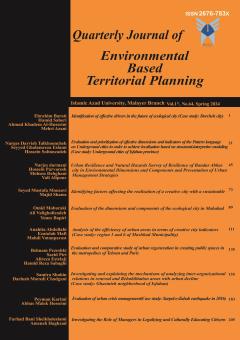شناسایی عوامل موثر بر تحقق شهر خلاق با رویکرد توسعه پایدار شهری
الموضوعات :
سید مصطفی موسوی
1
![]() ,
مجید شمس
2
,
مجید شمس
2
1 - دانشجوی دکتری گروه جغرافیا و برنامهریزی شهری، واحد ملایر، دانشگاه آزاد اسلامی، ملایر، ایرا
2 - استاد گروه جغرافیا و برنامه¬ریزی شهری، واحد ملایر، دانشگاه آزاد اسلامی، ملایر، ایران
الکلمات المفتاحية: روش فازی, شهر خلاق, توسعه شهری, توسعه پایدار.,
ملخص المقالة :
پدیده شهری شدن جهان اتفاق افتاده است. چنان چه به تقریب ٤٠٠ شهر در جهان وجود دارد که جمعیت هر یک از آنها بیش از یک میلیون نفر می باشد. در نتیجه افزایش شدید جمعیت، تعادل و توازن شهرها از بین رفت. بر این اساس مشکلات و چالشهای فراوانی از جمله اسکان غیررسمی و زاغهنشینی، بافتهای ناکارآمد، نابسامان و فرسوده، فقر شهری، آلودگیهای زیستمحیطی، بصری، هوا، آسیبهای اجتماعی و فرهنگی، گسست طبقات اجتماعی، ترافیک، کاهش روابط متقابل اجتماعی، از بین رفتن داراییهای طبیعی، اقتصاد غیررسمی و غیره فراروی کلانشهرها قرار گرفت. از این رو، برای مقابله با این چالشها و مسائل محیطی، اجتماعی، اقتصادی، فرهنگی و نهادی باید به ارایه راهکارهایی خلاقانه، نوآورانه و مبتنی بر دیدگاههای آینده پژوهانه همتگمارد. لذا لزوم تدوین یک الگوی مطلوب کلانشهر آینده مبتنی بر نظریات شهر خلاق برای کلانشهرها ضروری است؛ چنان چه انگیزه اصلی پژوهش حاضر توجه به این نکته ظریف و اثرگذار میباشد. به منظور تجزیه و تحلیل اطلاعات از روش ANP فازی استفاده می شود. نتایج نشان دهنده آن است که شاخص کالبدی (A3) بیشترین نزدیکی را به جواب ایده آل مثبت و بیشترین فاصله را از جواب ایده آل منفی دارا می باشد و الویت نخست مدل عوامل تحقق شهر خلاق با رویکرد توسعه پایدار شهری از لحاظ معیارهای موردنظر برای تاب آوری مدل عوامل تحقق شهر خلاق با رویکرد توسعه پایدار شهری می باشد.
1- پور رمضان، ع.، پورحسین روشن، ح.، علی اکبری، ص. 1395. شهر دانش بنیان: استراتژي توسعه آینده شهر زنجان به عنوان یک شهر پایدار و خلاق. فصلنامه آمایش محیط، 35: 192-171.
2- تاجدینی، م.، طبیبیان، م.، الهی، م. 1402. نگرش تحلیلی بر تحقق پارادایم ایرانی شهر عدالت¬محور در طرح توسعه شهري فرحزاد تهران. فصلنامه آمایش محیط، 62: 51-21.
3- مطلبیان، خ.، رحمانی، ب. 1399. برنامه¬ریزي و رهبري خلاق در شهر ایرانی اسلامی و ارتباط آن با خلاقیت شهري. فصلنامه آمایش محیط، 50: 132-111.
1. Afrin, S., Chowdhury, F. J., Rahman, M. M. 2021. COVID-19 pandemic: rethinking strategies for resilient urban design, perceptions, and planning. Frontiers in Sustainable Cities, 3: 263- 268.
2. Borén, T., Young, C. 2017. Artists and creative city policy: Resistance, the mundane and engagement in Stockholm, Sweden. City, Culture and Society, 8: 21-26.
3. Cajot, S., Peter, M., Bahu, J. M., Guignet, F., Koch, A., Maréchal, F. 2017. Obstacles in energy planning at the urban scale. Sustainable Cities and Society, 30: 223-236.
4. Cheshmehzangi, A., Dawodu, A. 2019. Sustainable Urban Development in the Age of Climate Change. In Sustainable Urban Development in the Age of Climate Change, 5: 157-182.
5. Della Lucia, M., Trunfio, M. 2018. The role of the private actor in cultural regeneration: Hybridizing cultural heritage with creativity in the city. Cities, 82: 35-44.
6. Dushkova, D., Haase, D. 2020. Not simply green: Nature-based solutions as a concept and practical approach for sustainability studies and planning agendas in cities. Land, 9(1): 19.
7. Greenwood, V. A., Dwyer, L. 2017. Reinventing Macau tourism: gambling on creativity? Current Issues in Tourism, 20(6): 580-602.
8. Frantzeskaki, N. 2019. Seven lessons for planning nature-based solutions in cities. Environmental Science & Policy, 93: 101-111.
9. Guzmán, P. C., Roders, A. P., Colenbrander, B. J. F. 2017. Measuring links between cultural heritage management and sustainable urban development: An overview of global monitoring tools. Cities, 60: 192-201.
10. Hatuka, T., Rosen-Zvi, I., Birnhack, M., Toch, E., Zur, H. 2018. The political premises of contemporary urban concepts: The global city, the sustainable city, the resilient city, the creative city, and the smart city. Planning Theory & Practice, 19(2): 160-179.
11. Hersperger, A. M., Oliveira, E., Pagliarin, S., Palka, G., Verburg, P., Bolliger, J., Grădinaru, S. 2018. Urban land-use change: The role of strategic spatial planning. Global Environmental Change, 51: 32-42.
12. Hidayat, A. R., Asmara, A. Y. 2017. Creative industry in supporting economy growth in Indonesia: Perspective of regional innovation system. In IOP Conference Series: Earth and Environmental Science, 70(1): 12-13.
13. Kagan, S., Hauerwaas, A., Holz, V., Wedler, P. 2018. Culture in sustainable urban development: Practices and policies for spaces of possibility and institutional innovations. City, Culture and Society, 13: 32-45.
14. Macke, J., Sarate, J. A. R., de Atayde Moschen, S. 2019. Smart sustainable cities evaluation and sense of community. Journal of Cleaner Production, 23: 103-118.
15. May, A., Boehler-Baedeker, S., Delgado, L., Durlin, T., Enache, M., van der Pas, J. W. 2017. Appropriate national policy frameworks for sustainable urban mobility plans. European transport research review, 9(1): 1-16.
16. Mengi, O., Drinkwater, S. B. D., Öner, A. C., Velibeyoğlu, K. 2017. Place management of a creative city: the case of Izmir. International Journal of Knowledge-Based Development, 8(3): 271-291.
17. Montalto, V., Moura, C. J. T., Langedijk, S., Saisana, M. 2019. Culture counts: An empirical approach to measure the cultural and creative vitality of European cities. Cities, 89: 167-185.
18. Moraci, F., Errigo, M. F., Fazia, C., Burgio, G., Foresta, S. 2018. Making less vulnerable cities: Resilience as a new paradigm of smart planning. Sustainability, 10(3): 755.
19. Richards, G. 2020. Designing creative places: The role of creative tourism. Annals of tourism research, 85: 102-122.
20. Rogerson, C. M. 2017. Creative industries and urban tourism: South African perspectives. In Urban Tourism in the Developing World, Routledge.
21. Söderström, O., Paasche, T., Klauser, F. 2020. Smart cities as corporate storytelling. In The Routledge companion to smart cities. Routledge.
22. Yassin, H. H. 2019. Livable city: An approach to pedestrianization through tactical urbanism. Alexandria Engineering Journal, 58(1): 251-259.


